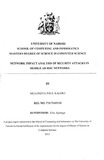| dc.description.abstract | Mobile ad hoc networks also known as MANETs have been used extensively for the
seamless provisioning of information exchange, where the deployment of infrastructure is
difficult, if not impossible. Such cases include remote rural areas with stringent
topographical profiles, disaster-recovery terrains, battlefields and popular event sites (i.e.
sports stadiums, exhibition venues). This new approach of networking brings a great
flexibility and affordability to the world of wireless communications by introducing
pervasive computing, document sharing, and smart sensors. However, since this kind of
network uses the wireless medium for communication, the wireless ad-hoc network faces
several security risks at different layers. A particularly severe security attack that affects
the ad hoc network routing protocols at the network layer, is known as the Black hole
attack. A malicious node advertises itself as having the freshest or shortest path to
destination. Once the black hole node attracts the traffic toward itself, the attacker can
misuse or discard the traffic and as a result data through the malicious node is lost.
To properly protect these systems with limited resources, the security practitioners need to
understand the possible security threats and their impacts on MANETs and have a
framework to ensure that the protections implemented to mitigate the vulnerabilities in the
systems are the most efficient ones possible.
In this Research the effects of Black hole attack on MANETs using Reactive routing
protocol, Ad-Hoc On Demand Distance Vector (AODV) and proactive routing protocol,
Optimized Link State Routing (OLSR) were studied using Network Engineering Tool
(OPNET) and their vulnerabilities compared. A framework for a methodical security
analysis and recommendation of efficient protection schemes was also developed. | en |

